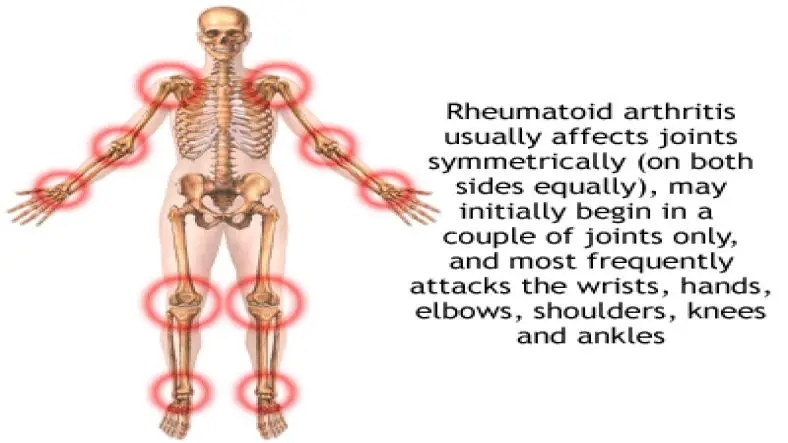Rheumatoid arthritis (RA) is a chronic inflammatory disorder that primarily affects the joints. It is an autoimmune condition, meaning the immune system mistakenly attacks the body's own tissues.
Symptoms:
- Joint pain and swelling: Commonly affects small joints in the hands, wrists and feet.
- Stiffness: Particularly pronounced in the morning or after periods of inactivity.
- Fatigue: Persistent tiredness and a general feeling of malaise.
- Fever: Low-grade fever may occur.
- Weight loss: Unintended loss of weight.
- Nodules: Firm lumps under the skin, often near pressure points.
- Symmetrical pattern: Affects the same joints on both sides of the body.
Causes:
- Genetics: Family history of RA can increase risk.
- Immune system dysfunction: The immune system mistakenly attacks the synovium (lining of the membranes that surround the joints).
- Environmental factors: Infections and other environmental triggers may contribute.
- Hormonal factors: Hormonal changes, particularly in women, can influence the development of RA.
Diagnosis:
- Medical history and physical examination: Assessing symptoms and joint involvement.
- Blood tests: Checking for
- Rheumatoid factor (RF) and anti-cyclic citrullinated peptide (anti-CCP) antibodies
- Inflammatory markers like C-reactive protein (CRP) and erythrocyte sedimentation rate (ESR)
- Imaging tests: X-rays, MRI, or ultrasound to detect joint damage and inflammation.
Treatment:
- Medications:
- Nonsteroidal anti-inflammatory drugs (NSAIDs): For pain relief and reducing inflammation.
- Corticosteroids: Quick-acting to reduce inflammation and suppress the immune system.
- Disease-modifying antirheumatic drugs (DMARDs): Slow disease progression and prevent joint damage.
- Biologic response modifiers (Biologics): Target specific parts of the immune system to reduce inflammation.
- Physical therapy: Exercises to maintain joint flexibility and strength.
- Lifestyle modifications: Regular, low-impact exercise, healthy diet and stress management.
- Surgery: Joint replacement or repair may be necessary in severe cases.
Recovery and Management:
- Regular medical check-ups: Continuous monitoring and treatment adjustments.
- Healthy lifestyle: Balanced diet, regular exercise, adequate rest and stress reduction.
- Support systems: Support groups, counseling and educational resources for coping strategies.
- Medication adherence: Consistent use of prescribed treatments to manage symptoms and prevent flare-ups.
- Self-care practices: Heat and cold therapies, assistive devices and ergonomic adjustments to reduce joint strain.
Prognosis
RA is a chronic condition with periods of flares and remissions. Early diagnosis and treatment can significantly improve quality of life and reduce the risk of severe joint damage and disability. Advances in treatment have improved outcomes, allowing many people with RA to lead active and productive lives.
Thanks for reading the article, for more Science and Technology related articles read and subscribe to peoples blog articles.














